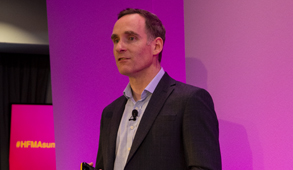Summer conference: digital aid to improve care

The long-term plan gave technology and NHS Digital a key role in achieving its ambitions. ‘It gives greater control to patients; there is a greater focus on integration and prevention and a push to tackle the significant health inequalities we have. We must also create a supportive and positive working environment to attract, retain and motivate the brightest and the best so we get the fantastic workforce we need to be successful.
‘All of this will help us deliver better value, reduce duplication, lead to better procurement and optimise support to the NHS.’
Mr Thomas (pictured) said he was proud of many of NHS Digital’s achievements. These included ensuring 95% of GP practices are connected to the NHS app and, in October last year, passing 1 billion transactions a month on the NHS spine – this level of transactions was on a similar scale to credit card processing in the UK, he said.
However, some of the basic digital services did not work as well as they should and NHS Digital is focusing on getting these fundamentals right, he said.
One fundamental that does not always work well is the sharing of patient records between different parts of the NHS. This was essential for seamless care if, say, a patient was referred to another hospital for more specialist care. ‘If you went to a different branch of your bank and they said they couldn't access your account from there, you would move banks,’ he said.
Effective data sharing was also useful to researchers, but the NHS had to gain patients’ trust to be able to do this, he added.
Related content
We are excited to bring you a fun packed Eastern Branch Conference in 2025 over three days.
This event is for those that will benefit from an overview of costing in the NHS or those new to costing and will cover why we cost and the processes.